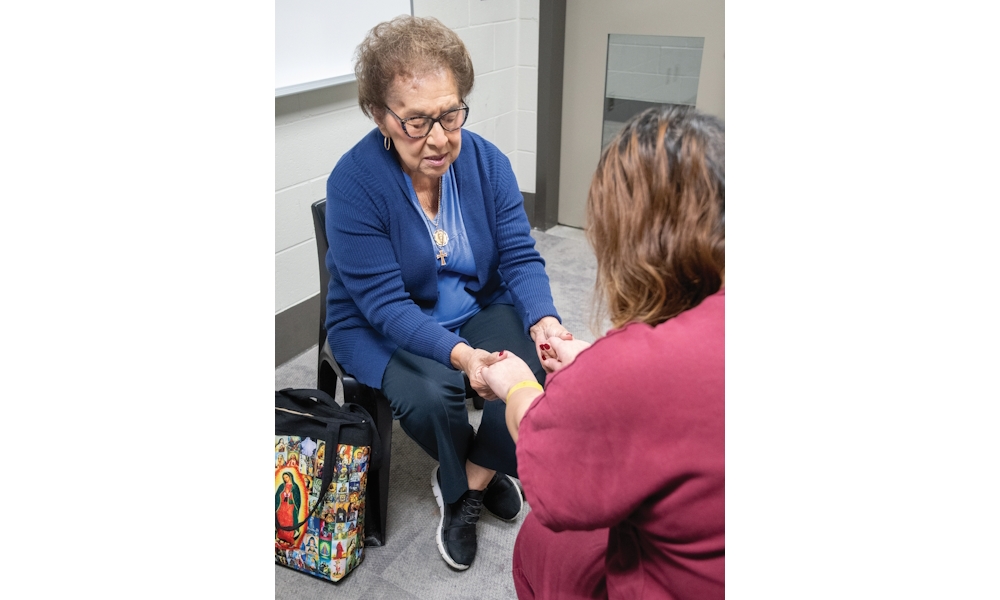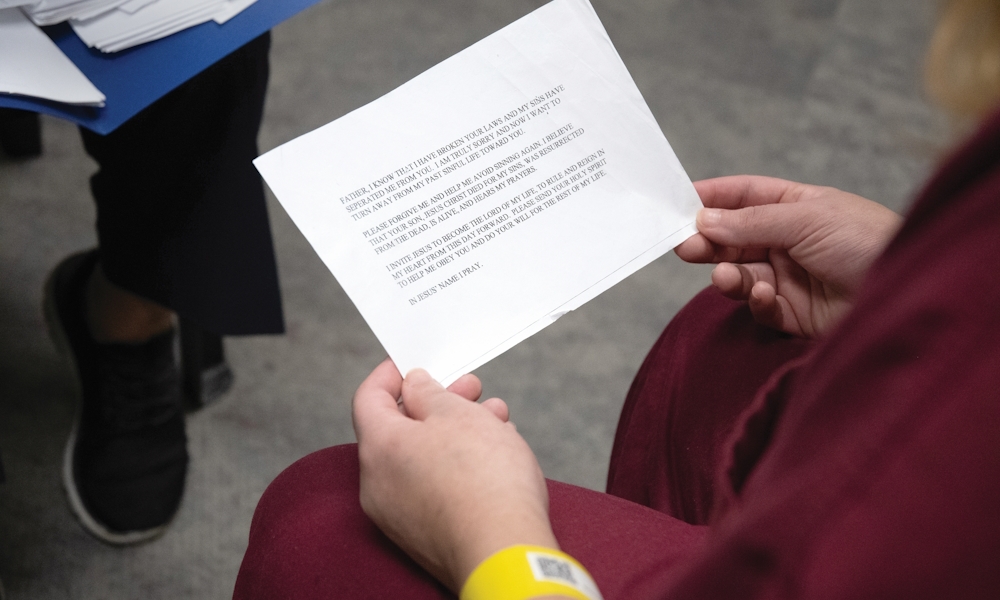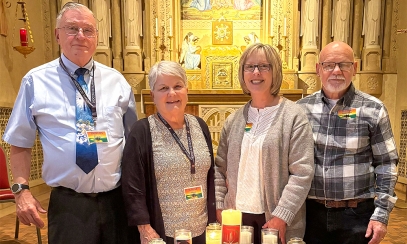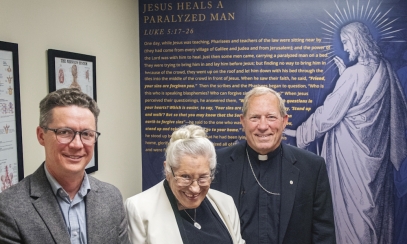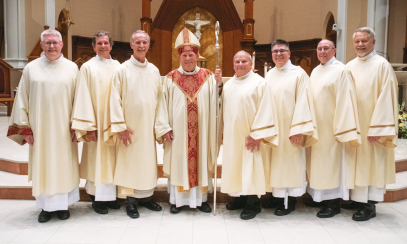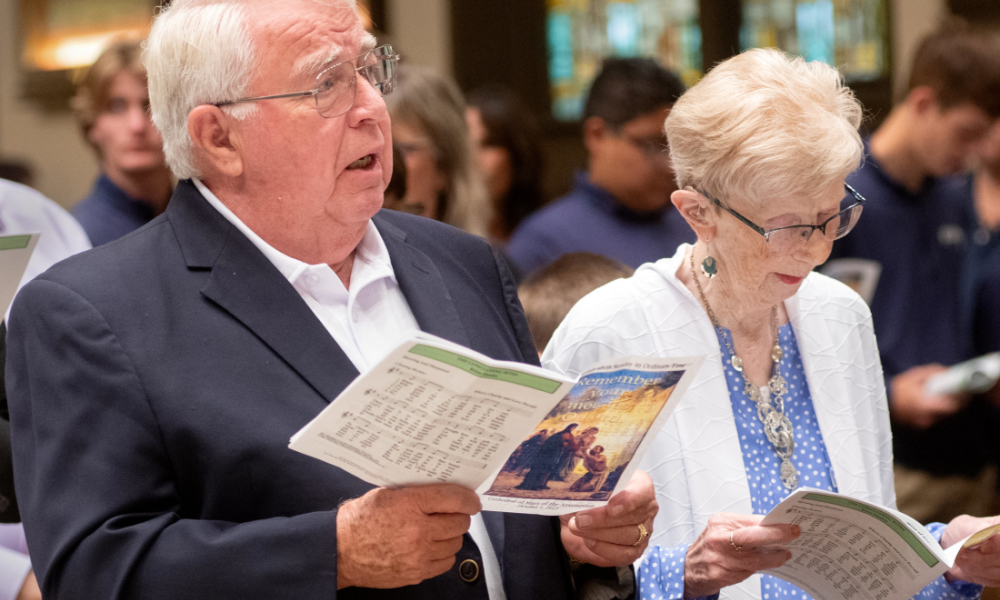
Embracing the heart of Jesus through prison and jail ministry
When Irv Potts began in the Catholic Diocese of Saginaw’s Lay Ecclesial Ministry Formation Program, he did not know or really think about what would come about as a result of the four-year formation experience. But Irv listened to the suggestions of the lay ministry director and instructors and started visiting inmates at the Saginaw County jail. After 15 years at the local level, he expanded his ministry. Now the retired chemist, who was a global director for research and development at the Dow Chemical Company, holds weekly Communion services at the Saginaw Correctional Facility in Freeland.
While Dave Salogar came upon his ministry at the Bay County Jail by a quite different path than Irv, they both admit that they believe their ministries have them where they ‘are supposed to serve’ in God’s plan for their lives.
“By the world’s standards, people would say I was successful in my career,” says Irv. “But something was missing.”
Dave says his work at the Bay County jail started as a way of healing following a family member being a fatal victim of a violent crime. “I realized I couldn’t carry the hate. There is a difference between forgiveness and justice,” he says.
For both gentlemen and others serving in jail and prison ministries, there has been an increased awareness and support over the past few years thanks to the work of this ministry of the Diocese of Saginaw’s Office of Parish Life and Evangelization.
“In the past, we didn’t have structure. Lori (Becker) is helping to grow the program,” Dave says.
Lori, the Diocese of Saginaw’s coordinator of Diocesan Outreach, notes that Bishop Robert Gruss has identified jail and prison ministry as a priority and charged her with organizing and expanding these efforts. “There were people doing this type of ministry, but they were kind of doing their own thing,” says Lori, who helps to encourage others to begin discerning about jail and prison ministry, coordinates training for current and new ministers and supplies materials for the work. “In the past, we made do,” says Irv, a parishioner at Our Lady of Grace Parish in Sanford.
Dave comments that Lori's work is much needed. The majority of the Catholics in the Diocese who are involved in jail and prison ministry are of retirement age or older.
“We need to get younger people to take over,” he says.
Bishop Gruss promised continued assistance for current and future jail and prison ministers and noted his dedication to growing the ministry during a special Mass in October at the Cathedral of Mary of the Assumption. Bishop Gruss offered a special blessing for jail and prison ministers and gifted them each with a special cross.
In a presentation following the Mass, Bishop Gruss read from the Gospel of Matthew (25:35-40): “ ‘For I was hungry and you gave me food, I was thirsty and you gave me drink, a stranger and you welcomed me, naked and you clothed me, ill and you cared for me, in prison and you visited me.’ Then the righteous will answer him and say, ‘Lord, when did we see you hungry and feed you, or thirsty and give you drink? When did we see you a stranger and welcome you, or naked and clothe you? When did we see you ill or in prison and visit you?’ And the king will say to them in reply, ‘Amen I say to you, whatever you do for one of these least brothers of mine, you do for me.’ “
“As someone once told me, it seems that this Gospel passage is the final exam to get into heaven,” Bishop Gruss said. “Whenever you go to a prison or jail and minister to the inmates, you are ministering to Jesus. You are the face of Jesus to them; and they are the face of Jesus to you.”
Ruth Gomez, a parishioner at St. John Paul II in Carrollton who has been ministering at the Saginaw County Jail for nearly 20 years, agrees.
“Yes, I minister to them, but they also minister to me,” she says.
Currently there are no Catholic lay jail or prison ministers in five of the 11 counties that comprise the Diocese of Saginaw, Lori notes. In addition to the lay ministers, one diocesan permanent deacon and three priests also are among those who regularly minister to those incarcerated.
The ministry training offered by the Diocese is a thorough program established by the Catholic Prison Ministries Coalition and endorsed by the United States Conference of Catholic Bishops. The training starts with a discernment seminar and continues with one-on-one meetings with Lori to explore the ministry in more depth. Following are six training sessions over the course of 12 weeks, created by the National Catholic Association of Chaplains, which focus on how to be a listening presence, establishing boundaries and what to expect when going into a correctional facility. New ministers will then minister side-by-side with an experienced volunteer for a year.
Irv points out that while some tend to think of jail ministry and prison ministry as the same, they are quite different. Jails are places where people are detained while awaiting judgment of their criminal charges, while prisons are places where people who are convicted of a crime are sent to serve out their sentences.
The types of ministries available in county jails and prisons differ – and there are variations county to county, Lori says.
In Bay County’s jail, Dave, a parishioner at Our Lady of Peace in Bay City, and other jail ministers lead weekly ecumenical prayer services. Catholic and non-Catholic inmates are welcome to attend - that is if they are eligible by means of their behavior in jail and expressed interest. The number of participants has decreased since the global pandemic, when there were no visits, but now there are regularly 10 to 15 inmates at the services. The service consists of scripture readings, hymns, prayer intentions and group sharing. The sharing can vary greatly, Dave says. “I had one person who wanted to pray for the victims of his crime.”
Dave hopes that the Bay County one-on-one visits, which have not occurred since the pandemic, will return soon. In those sessions, inmates are more apt to share and very often want to talk and pray about their concerns for their families, especially their children, as well as those who will care for and support them. They also have fears of prison if they are convicted and sentenced.
Dave also notes how inmates can change their lifestyles when they are released from jail if they are not sentenced to time in prison.
“We talk about what they are going to do to not repeat past behaviors,” he says. Topics include how inmates will avoid drugs and how they can break the cycle of repeat crimes are frequently part of the discussions.
“While they are in jail, they are not in the environment which contributed to them being in jail. We talk about how they are going to change their lives once they get out,” he adds, noting that when they are released, many will return to dysfunctional families and others who may have been influential as to the reason they are in jail. There are also concerns about getting jobs.
“Once you have that black mark (of being in jail), it is hard to get work,” Dave says.
In the Freeland prison, Irv and others lead weekly Communion services which include the Mass readings for the upcoming Sunday, sometimes read by the prisoners, a reflection and Holy Communion.
They also hold two retreat-style gatherings each year in the prison, which he describes as “intense and moving.” The Thursday through Sunday sessions are structured with talks and sharing. Following the presentations, attendees are asked to explain what they heard in the presentations. Participants often are not open to sharing, but they get more comfortable by the second day.
“It’s amazing the changes you see over the course of the retreat,” Irv says.
However, those who attend the services and retreats sometimes have difficult experiences with other inmates when the ministers leave.
“Some have issues with being ‘a church person’ when they go back to the population,” he says.
Ruth says that although she had never had any trepidation or reservations about meeting with detainees, over time her feelings, actions and how she ministers has evolved. “In the beginning I didn’t shake hands,” she says. She knows that part of her ministry is being hospitable to those she visits. “They have to feel welcome and comfortable when we meet.”
Irv admits that in his early days of ministry there was a bit of a fear factor of meeting one-on-one with an inmate for 15 to 20 minutes in a locked room. But that lifted when he prayed himself.
“I would have no idea why they were there, but I knew this is what the Lord wants me to do,” he says. “He will protect me.”
Ruth notes that she knows she makes a difference to inmates in small and large ways. Sometimes it is just that someone thanks her for her time and for listening and praying with them; but others ask her about her home parish.
“I tell them, ‘when you get out of here, you are more than welcome at any time.’”
For more information about becoming a jail or prison minister, contact Lori Becker, coordinator of diocesan outreach for the Catholic Diocese of Saginaw at 989-797-6652 or lbecker@diosag.org or go to https://saginaw.org/jail-prison-ministry.

